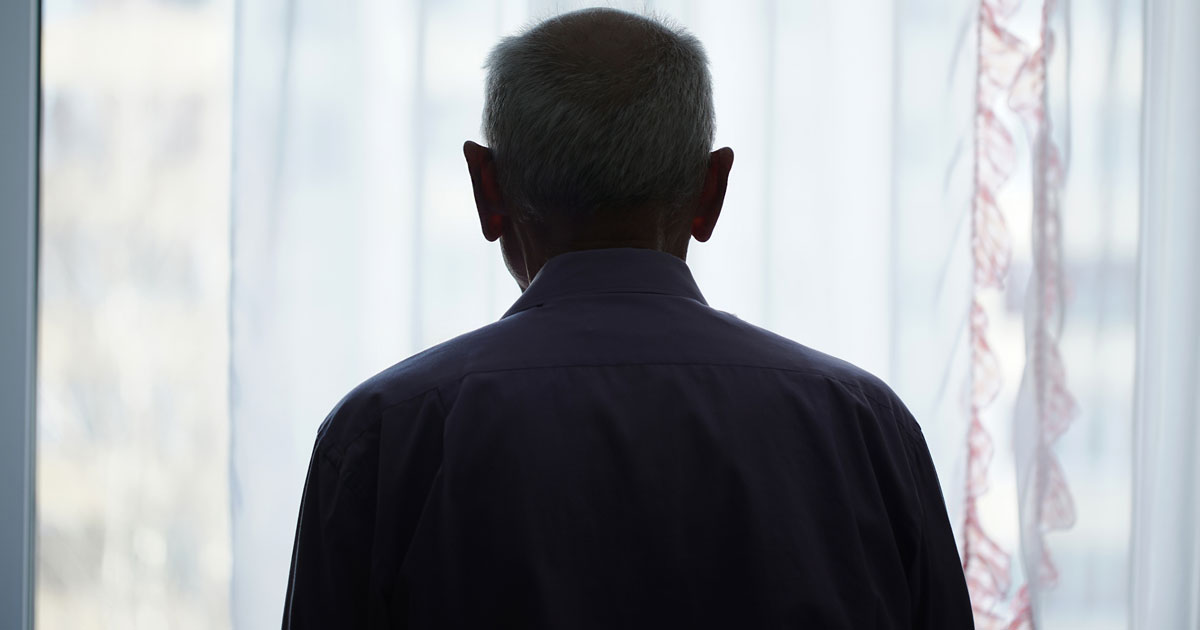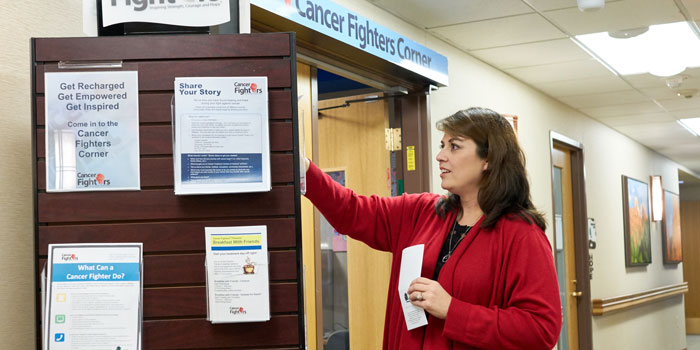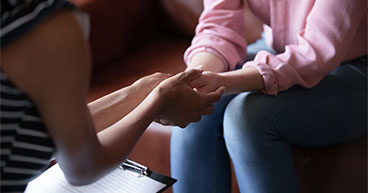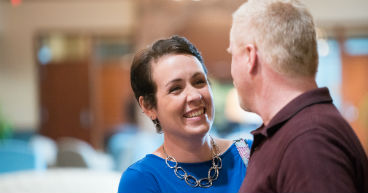
People live alone or may be isolated from family and friends for many reasons. Maybe they don’t enjoy socializing or have difficulty building personal relationships. Perhaps they’re divorced, a spouse or family members have passed away, or they’ve moved to a different state for professional or personal reasons.
Some people enjoy being alone. But those who don’t often become lonely. The levels of comfort vary greatly when it comes to being alone, says Alexandria Callahan, Behavioral Health Supervisor and Sexual Health Liaison at Cancer Treatment Centers of America® (CTCA), Chicago.
For some cancer patients, being alone causes physical and emotional challenges that may be difficult to navigate, especially if the diagnosis thrusts them into isolation as they choose not to share their burden with others.
“It’s situational, based on the diagnosis, level of treatment and mobility,” Callahan says. “Alone is OK if that’s what you choose. Being alone is different for everyone.”
In this article, we’ll explain the challenges and choices patients may face when navigating a cancer diagnosis and treatment without a family or support system. Topics include:
- Choosing to be alone
- Needing help after surgery
- Navigating the dating scene
- Coping with depression
- Connecting with Cancer Fighters®
If you’d like to learn more about the behavioral health services we offer cancer patients at CTCA®, or if you’d like a second opinion on your cancer diagnosis and treatment plan, call us or chat online with a member of our team.
Why some choose to be alone
More than 100 million U.S. adults are divorced, widowed or never married, and more than a third of them live alone. In fact, the number of Americans who live by themselves rose from about 33 million in 2011 to 37 million in 2021, according to the U.S. Census Bureau.
More Americans live alone as they get older. While fewer than 10 percent of Americans live alone in their 30s and 40s, about 25 percent live by themselves at age 75, when they’re more likely to be diagnosed with cancer or face other health issues.
Many patients who are by themselves choose to stay that way and don’t want to ask for help, even after a cancer diagnosis. “This is how they functioned before cancer, and just because they have cancer now doesn’t mean they have to change their entire world,” Callahan says.
Sometimes, it’s a challenge to even allow their care teams to help them or make suggestions. That’s why Callahan reminds patients that their cancer care may be a temporary situation, so asking for help while going through treatment and as their body heals isn’t a forever situation.
Some patients may have big families or a large circle of friends and still choose to go through treatment by themselves.
“They’ll say, ‘I don’t have to focus on anyone else, and I don’t have to worry about anything else. I just have to focus on myself and my health, and I can get through this. I’m still able to work, and that’s all I need,’” she says.
Callahan encourages patients to call their care team or behavioral health provider if they need help or have questions. They should know, too, that their care team will likely check in on them occasionally, so help and support are available, even if they don’t want to ask for it.
Callahan also offers these tips for patients who are alone:
- Ask a lot of questions to help ensure you’re aware of the challenges ahead and issues that may pop up along the treatment journey.
- Consider accepting help if it’s offered. There are times when going it alone isn’t practical or even possible.
- Understand your care schedule and be sure you know how you’re getting to and from treatments.
- Know whom to call for help, even if you don’t expect to ask.
- Give yourself extra love and take the time to focus on yourself and your healing.
Those who live alone, but perhaps no longer want to, may consider rekindling old relationships or reaching out to those with whom they’ve lost touch.
“It’s not unusual for people when they get a cancer diagnosis to say, ‘I’m looking at my life differently, and my perspective has changed,’” Callahan says. “There are some relationships you may want to mend or people you may want to apologize to.”
Needing help after surgery
Sometimes, being alone during cancer treatment simply isn’t practical and may even be dangerous. Cancer treatments often take a toll on the body, making it difficult to perform normal tasks, such as shopping, cooking or even bathing.
This is especially true after surgery, says Peter Baik, MD, Thoracic Surgeon at CTCA Chicago and CTCA Phoenix.
“When you live alone and don't have the support, it can be very difficult,” Dr. Baik says. “If you have a procedure done, how are you going to get home? What if you get home and your pain isn’t controlled? How are you going to get prescriptions if you don’t have a caregiver and can't even drive? There are certain things you’ll definitely need help with.”
Patients undergoing treatment may need help getting to and from the hospital. Surgical patients almost always have in-person follow-up visits.
“If patients have had major surgery, they’re not going to be 100 percent for quite a while,” Dr. Baik says. “They have to make sure that they're staying safe, getting their food and have someone they can call who can help as soon as possible.”
That’s why Dr. Baik encourages patients to make sure they have people to turn to when they return home after surgery to better ensure a smooth recovery.
Navigating the dating scene
Author and entrepreneur Christina Morena discovered a mine field of anxiety and heartbreak while navigating the dating scene during her treatment for breast cancer.
“The mere mention of the word ‘cancer’ would move the date to its end, and I would never hear from them again,” she wrote in a blog on cancer.net. “My dates would simply vanish. While cancer seemed to be sparing me, it was killing off my dates.”
As a single mother and cancer patient, Morena said she felt a “deep aloneness” and a fear of dying alone and was hoping to find a partner who could help support her emotionally during her cancer journey. But her dating experiences prompted her to put a hold on that aspect of her social life and focus on herself—a decision she didn’t regret.
“The gift of my own presence has truly felt delightful,” she wrote. “I learned that being single was better than having superficial togetherness.”
If cancer patients choose to socialize and date during their journey, they should rely on their own comfort level of what they’re willing to share or say, Callahan says.
“We tell them, ‘If you want to date, absolutely get out there,’” she says. “‘Disclose as much as you feel comfortable with. You don’t have to tell people your whole medical history, and you don’t have to tell them you’re going through chemotherapy.’”
As an alternative to dating, Callahan recommends participating in more meetups or group outings that may offer a chance to socialize more with people who have similar interests.
Coping with depression
Depression is the most common mental health side effect of cancer. About one in four cancer patients deal with clinical depression during their cancer journey, according to the American Cancer Society.
“It’s not so much about avoiding depression, because when you’re facing your life, you’re going to go through those bouts,” she says. “The last thing we want is for them to slip into a deeper depression where they’re not coming out for treatment and can get to the point of suicide risk.”
Being alone while experiencing these emotions is challenging for some cancer patients.
Callahan says her patients are given a survey to help assess their level of anxiety and depression. Then, behavioral health providers meet regularly with them as part of their treatment plan, helping them navigate the emotional ups and downs that often accompany a cancer diagnosis.
“It can be difficult to discern whether a cancer patient is struggling with depression or whether the symptoms of the cancer diagnosis and treatment are what’s causing behavioral changes,” says Diane Schaab, Behavioral Health Therapist at CTCA Atlanta. “A professional counselor is able to assess whether a patient is no longer able to perform a certain activity or whether he or she no longer wants to do the activity because of depression.”
When you’re not feeling well, the key is to know what helps. Callahan says patients who live alone may find it difficult to climb out of a depression, especially if they’re not feeling well. But there are steps they can take to help lift their mood:
- Meditate. Take some deep breaths to help relax and calm the mind and body.
- Read a good book.
- Write out your thoughts and feelings in a journal or diary.
- Engage in a hobby you enjoy.
- Consider getting a pet.
- Exercise. Go out for a walk and get some fresh air.

Connecting with Cancer Fighters
CTCA cancer patients have lots of available support in the Cancer Fighters community.
Created by CTCA cancer patients more than 30 years ago, Cancer Fighters help new and current patients connect with other patients, caregivers and cancer survivors who can share their experiences. These volunteers are also available to support patients during their care at CTCA.
The Cancer Fighters program:
Connects patients with others who have been touched by cancer and who can offer personalized support and comfort
Empowers patients with answers to questions about what to expect during a cancer journey and provides access to resources on cancer information and research
Involves patients, if they choose, in fun events and gatherings
Learn more about the Cancer Fighters program.
If you’d like to learn more about the behavioral health services we offer cancer patients at CTCA, or if you’d like a second opinion on your cancer diagnosis and treatment plan, call us or chat online with a member of our team.



